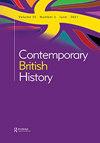“保持工党”:1994-2007年新工党的草根联盟和激进分子反对派
IF 0.5
2区 历史学
Q1 HISTORY
引用次数: 0
摘要
1998年10月,托尼·布莱尔在选举中遭遇了尴尬的失败,来自中左翼草根联盟(CLGA)的四名积极分子被选入工党全国执行委员会。尽管布莱尔试图使工党“现代化”,并抛弃“旧工党”的意识形态包袱,但这次选举显示了工党左翼在党员中的持续选举竞争力,以及对新工党轨迹的敌意。本文探讨了CLGA的建立和选举的成功,作为工党左派如何在新工党时期改变其政治策略和言论的说明性案例研究。这有助于填补现有文献中的一个重大空白,即对新工党有组织的异议经常被忽视。在CLGA中,工党左派形成了以前认为不可能的广泛的跨派系联盟,并监督了从批评到热情捍卫战后社会民主和“劳工主义”政治文化的言论转变。除了20世纪80年代后工党左翼部署的不断变化的政治策略外,本文还展示了新工党的反传统主义和“旧工党”这个贬义标签的创建如何产生了意想不到的后果,即消除了对手之间复杂的派系分歧,并促进了跨派系的激进反对派。本文章由计算机程序翻译,如有差异,请以英文原文为准。
‘Keep the party Labour’: the Grassroots Alliance and activist opposition to New Labour, 1994-2007
ABSTRACT In October 1998, Tony Blair suffered an embarrassing electoral defeat when four activists from the Centre-Left Grassroots Alliance (CLGA) were elected to the Labour Party’s National Executive Committee. Despite Blair’s attempts to ‘modernise’ the Labour Party and abandon the ideological baggage of ‘Old Labour’, the election demonstrated the continued electoral competitiveness of the Labour Left among the party membership, and hostility towards New Labour’s trajectory. This article explores the CLGA’s foundation and electoral success as an illustrative case study of how the Labour Left altered its political strategy and rhetoric in the New Labour years. This helps to fill a significant gap in the existing literature, where organised dissent to New Labour has often been overlooked. The CLGA saw the Labour Left form broad cross-factional alliances previously thought impossible, as well as oversee a shift in rhetoric from criticising to passionately defending post-war social democracy and the political culture of ‘labourism’. Alongside the changing political strategies deployed by the Labour Left after the 1980s, this article also demonstrates how New Labour’s iconoclasm and the creation of the pejorative label of ‘Old Labour’ had the unintended consequences of erasing complex factional divides among opponents and facilitating a cross-factional activist opposition.
求助全文
通过发布文献求助,成功后即可免费获取论文全文。
去求助
来源期刊

Contemporary British History
HISTORY-
CiteScore
1.40
自引率
14.30%
发文量
34
期刊介绍:
Contemporary British History offers innovative new research on any aspect of British history - foreign, Commonwealth, political, social, cultural or economic - dealing with the period since the First World War. The editors welcome work which involves cross-disciplinary insights, as the journal seeks to reflect the work of all those interested in the recent past in Britain, whatever their subject specialism. Work which places contemporary Britain within a comparative (whether historical or international) context is also encouraged. In addition to articles, the journal regularly features interviews and profiles, archive reports, and a substantial review section.
 求助内容:
求助内容: 应助结果提醒方式:
应助结果提醒方式:


